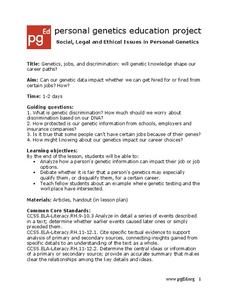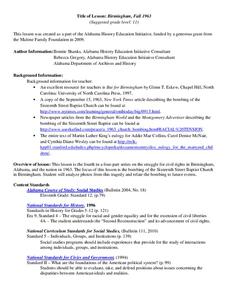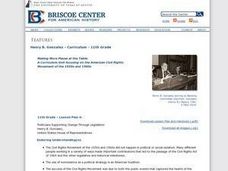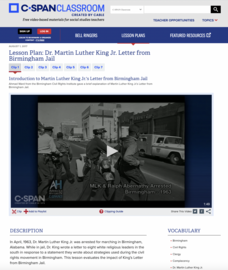Curated OER
The Kansas-Nebraska Act of 1854: Popular Sovereignty and the Political Polarization over Slavery
Why did Stephen Douglas support the Kansas-Nebraska Act of 1854? Why did Abraham Lincoln oppose it? Young historians examine how the Kansas-Nebraska Act of 1854 affected the political balance between free and slave states and explore how...
Teaching Tolerance
Using Photographs to Teach Social Justice | Confronting Unjust Practices
A powerful photograph of the Freedom Riders of 1961 launches an examination of the de jure and de facto injustices that the civil rights movement of the 1950s and 1960s addressed. Young historians first watch a video and read the Supreme...
Curated OER
Running for Freedom: The FUgitive Slave law and the Coming of the Civil War
In order to understand the complicated nature of slave laws during the Civil War, learners compare and contrast an abolitionist poster and a runaway slave ad. They use an attached worksheet to consider each primary source document, then...
Teaching Tolerance
The True History of Voting Rights
Explore what voting rights really are in an intriguing activity that explores the history of American voting. The resource examines the timeline of voting rights in the United States with group discussions, hands-on-activities, and...
Personal Genetics Education Project
Genetics, Jobs and Your Rights
Your class will read an overview of the Genetic Information Nondiscrimination Act, passed in 2008 and address the question of whether or not genetic information should be used to influence our career paths. In jigsaw style, they then are...
Curated OER
The Right to Remain Resilient
Students examine the Civil Rights Movements in the U.S., both current and historic. In small groups students investigate a specific civil rights group, create an illustrated timeline, noting key events, people, and state and federal laws.
Curated OER
Marriage Equality: Different Strategies for Attaining Equal Rights
Students examine gays rights issues in the United States. In this gay marriage lesson, students investigate how people have made their cases before the executive, legislative, and judicial branches of government to secure their civil...
Curated OER
Race and Voting in the Segregated South
Learners examine the history of African American voting rights. In this voting rights lesson, students listen to a lecture on African American voting rights between the years 1890 and 1965. Learners respond to discussion questions...
PBS
Out of the Shadows | Black America Since MLK: And Still I Rise
Two powerful video clips launch a study of race relations in the United States after the Selma, Alabama riots, the passage of the Votings Rights Act, and the riots in Watts, California.
Judicial Learning Center
American Equality Milestones
Has equality always existed as an unalienable right in the United States? Use this worksheet to chronicle the history and progression of equality in major documents and speeches throughout American history. The graphic organizer asks...
Curated OER
The Election of Barack Obama 44th President of the United States
Students consider the historic implications of Barack Obama's election. In this election of 2008 instructional activity, students research Obama's accomplishments and determine how his election signifies the success of the American Civil...
Curated OER
Picturing Freedom: Selma-to-Montgomery March, 1965
Students analyze primary sources to investigate the Civil Rights Movement. In this Civil Rights lesson plan, students explore the passage of Voting Rights Act of 1965 and how photojournalism impacted the passage of the legislation....
Curated OER
Gandhi's Life and Guiding Principles
Second graders investigate philosophy by researching the life of Mahatma Gandhi. In this biographical lesson, 2nd graders listen to a reading of the book "Gandhi" and make a character map of his actions, feelings and thoughts. Students...
Curated OER
Growing Like Dr. King
Students explore American History by reading biographical material. In this civil rights lesson, students read information about Martin Luther King Jr. and his successful demonstrations which led to equal rights for African Americans....
Museum of Tolerance
Making Lemonade: Responding to Oppression in Empowering Ways
An activity focused on tolerance encourages class members to consider how they might respond when they or someone else is the target of oppression and discrimination. After researching how some key figures responded to the anti-Semitism...
Carolina K-12
African Americans in the United States Congress During Reconstruction
The Civil Rights Act of 1866, which granted citizenship to all males in the U.S., resulted in the first African Americans to be elected to Congress. Class members research 11 of these men, the challenges they faced, and craft...
Student Handouts
Constitutional Principles
Keep track of constitutional principles with a graphic organizer. Pupils define, describe the origins of, and note down the location of the following terms: checks and balances, federalism, individual rights, limited government, popular...
Curated OER
The Kennedy Administration and the Civil Rights Movement
Students evaluate the Kennedy Administration's involvement in the civil rights movement. In this Civil rights instructional activity, students read and take notes from speeches connected to the historic March on Washington from the...
Curated OER
Paul Conrad's Perspective on Civil Rights
Students review a political cartoon and discuss desegregation. In this cartoon analysis lesson, 11th graders discuss the impact of a political cartoon and its relation to a Supreme Court case. Students read additional information and...
Alabama Department of Archives and History
Birmingham, Fall 1963
Can any good come from acts of evil? The 1963 bombing of the Sixteenth Street Baptist Church in Birmingham, Alabama, and the eventual outcomes of the tragedy, are the focus of a lesson that asks groups to examine primary source documents...
Curated OER
Civil Rights Movement in America
Eleventh graders explore the Civil Rights movement as a culmination of history and cultural perspectives developed from the Slave Trade and Reconstruction. They identify leading persons and organizations and their personal philosophy to...
Curated OER
Making More Places at the Table: The American Civil Rights Movement of the 50's and 60's
Eleventh graders examine the biography of Henry B. Gonzalez. They examine primary source documents from Congressman Gonzalez's personal papers related to his contributions to the Civil Rights Movement.
Curated OER
Martin Luther King, Jr.
In this Martin Luther King learning exercise, students read a passage about King. They then answer six multiple choice recall questions about the story.
C-SPAN
Dr. Martin Luther King Jr.'s Letter from Birmingham Jail
Timing is everything. Introduce young historians to Dr. Martin Luther King, Jr.'s "Letter from Birmingham Jail" with a resource that underscores the significance of the timing of the Good Friday Birmingham march, King's subsequent...
Other popular searches
- Civil Rights Act 1964
- Civil Rights Act of 1964
- Civil Rights Activism
- Civil Rights Act 2001
- Civil Rights Act Canada
- Civil Rights Act 1965
- Civil Rights Act 1866
- Civil Rights Act 1968
- Civil Rights Activists
- Civil Rights Act of 1866
- Jewish Civil Rights Activists
- Civil Rights Activities

























